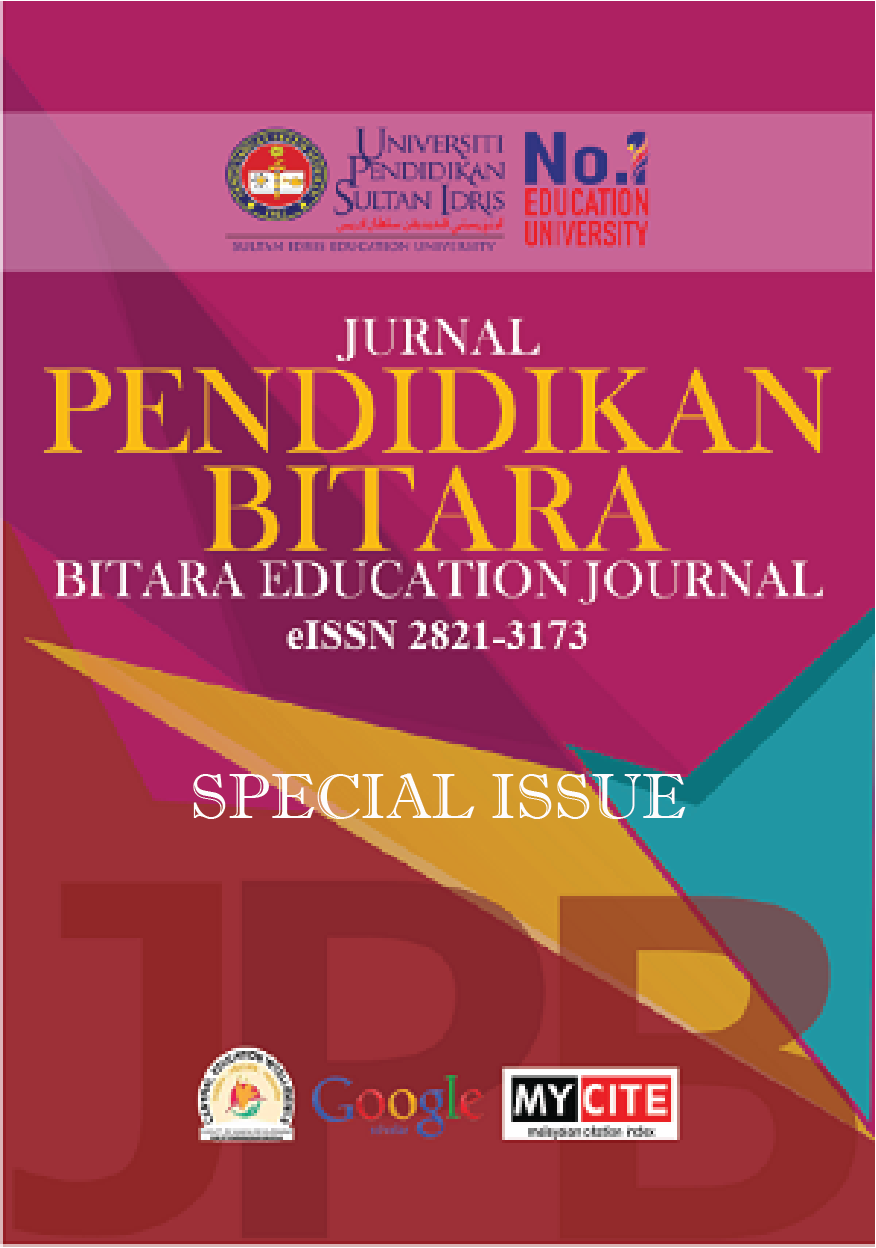Gender Polarisation and Preservice Teachers' Behavioural Affection towards Inclusive Education
DOI:
https://doi.org/10.37134/bitara.vol17.sp.4.2024Keywords:
Gender, Teacher training programme, Preservice teachers, Behavioural affection, Inclusive Education, T-testAbstract
In light of the fact that one gender predominates in Malaysia's teacher training programmes and teaching profession, it is evident that research on attitude and gender is vital. This study looked at the behavioral affinity preservice teachers have for inclusive education in regard to gender. This study used the survey method with a quantitative research methodology. A series of questionnaires was distributed to the respondents, who comprised 189 females and 65 males. Descriptive statistics and the independent sample t-test were employed. The results demonstrated that the preservice teachers' behavioral attachment for inclusive education was not gender-related [t(252)=1.499, p=.137]. It follows that preservice teachers' attitudes on inclusive education are not significantly influenced by their gender. The findings of this study suggest that gender-based interventions should not be the exclusive focus of initiatives to support inclusive education among preservice teachers. Rather, focus should be placed on other characteristics, such as exposure to inclusive education techniques. Furthermore, by shedding light on preservice teachers' perceptions of inclusive education, this study adds to the corpus of research already available on the subject. These results can be used by educators and policymakers to create teacher training programmes that effectively support inclusive teaching methods.
Downloads
References
Abdullah, N., Yasin, M. H. M., & Toran, H. (2022). Knowledge and attitudes of Pre-Service teachers in North Malaysia related to inclusive education for special educational need students. International Journal of Academic Research in Business & Social Sciences, 12(8). https://doi.org/10.6007/ijarbss/v12-i8/14674
Ainscow, M., & Miles, S. (2008). Making Education for All inclusive: where next? Prospects, 38(1), 15–34. https://doi.org/10.1007/s11125-008-9055-0
Anuradha, G., & Shuvankar, M. (2014). Attitudes of Pre-service teachers towards the approach of Inclusive Education. Journal of Emerging Technologies and Innovative Research, 10(5), 94-102. https://www.jetir.org/papers/JETIR2305217.pdf
Clipa, O., Mata, L., & Lazar, I. (2019). Measuring In-Service Teachers’ attitudes towards Inclusive Education. International Journal of Disability, Development and Education, 67(2), 135–150. https://doi.org/10.1080/1034912x.2019.1679723
Connell, R. W. (2021). Gender: In World Perspective. Polity.
Couper, M. P. (2000). Internet research: A new era for social science research? American Behavioral Scientist, 43(6), 857-874.
Florian, L., & Black-Hawkins, K. (2011). Exploring inclusive pedagogy. British Educational Research Journal, 37(5), 813–828. http://www.jstor.org/stable/23077052
Kim, H. (2013). Statistical notes for clinical researchers: assessing normal distribution (2) using skewness and kurtosis. Restorative Dentistry & Endodontics, 38(1), 52. https://doi.org/10.5395/rde.2013.38.1.52
Kent, A. L., Helengrace, L, Vinchail, S., Ryan, B. C., Ednalyn, D. C., & Ericson, O, A. (2022). Attitude towards Inclusive Education (IE) among prospective teachers: Is there gender polarization? International Journal of Special Education, 37(3), 4946-4958. https://eric.ed.gov/?id=ED618571
Landis, A. F. (2019). Pre-service teacher attitudes toward inclusion in the classroom. Ramifications, 1(1). https://digitalcommons.wcupa.edu/ramifications/vol1/iss1/1
Nunnally, J. C. and Bernstein, I. H. (1994). Psychometric Theory. McGraw-Hill.
Orakcı, Ş., Aktan, O., Toraman, Ç., & Çevik, H. (2016). The Influence of Gender and Special Education Training on Attitudes towards Inclusion. International Journal of Instruction, 9(2), 107–122. https://doi.org/10.12973/iji.2016.928a
Pijl, S. J., Frostad, P., & Mjaavatn, P. E. (2013). Inclusive education in Europe: A critical reflection. European Journal of Special Needs Education, 28(4), 423-437. https://www.european-agency.org/sites/default/files/IC%20Researchers%20paper.pdf
Poulou, M. (2007). Personal Teaching Efficacy and Its Sources: Student teachers’ perceptions. Educational Psychology, 27(2), 191–218. https://doi.org/10.1080/01443410601066693
pubhtml5.com. (2020, October 18). Statistics for the Behavioral Sciences 10th Edition. Pubhtml5. https://pubhtml5.com/dhqc/utpn/Statistics_for_the_Behavioral_Sciences_10th_Edition/
Ridgeway, C. L., & Correll, S. J. (2004). Unpacking the gender system: A theoretical perspectives on gender beliefs and social relations. Gender & Society, 18(4), 510–531. https://doi.org/10.1177/0891243204265269
Slee, R., & Weiner, G. (2019). Inclusive education and its discontents: International perspectives on inclusive education. Routledge.
The Skinner primer : behind freedom and dignity : Carpenter, Finley : Free Download, Borrow, and Streaming : Internet Archive. (1974). Internet Archive. https://archive.org/details/skinnerprimerbeh00carp
Downloads
Published
Issue
Section
License
Copyright (c) 2024 Teng Kie Yin, Ernia Syafeka Sam, Kelvin Yiung Shi Hong, Lee Wen Qing, Mohd Harris Haiqal Ahmad Moslini

This work is licensed under a Creative Commons Attribution-NonCommercial-ShareAlike 4.0 International License.





